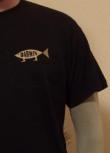
|
Various topics » Ecohumanism Nature and the Universe Are My God Editor's note: This is another article, #4,in our series "Ecohumanism," an intellectual project initiated by the American Rationalist in 1998, prior to and independently from, the book Ecohumanism, edited by Robert Tapp and published by Prometheus in 2003. Tapp's book was reviewed by William Harwood in the 2002 Jan/Feb issue of AR and the review recently posted online on Amazon.com." -Kaz Dziamka * The other day I was sitting on my patio with nothing to do. As I sat there I looked up at the sky, with its luminous clouds, and the mountains surrounding me. I was in awe at the mysterious beauty of it all. Suddenly I had a feeling of satisfaction that gave a feeling of inner happiness that I seldom feel except when I am alone with Nature. I wondered why I could not hold this feeling when I was not absorbed in the admiration of Nature. Then it occurred to me. Humans have a genetic drive to love Nature. This genetic urge is necessary for our survival. We are completely dependent upon Nature. We cannot exist without Nature and Nature on earth cannot exist without us. We as observers, bring earth and its Nature to life by observing it and it keeps us alive by supplying our needs. Through our genes we are forced to work towards a better understanding of Nature, and as we understand it better, we develop a feeling of satisfaction and happiness. The more we are in awe of the beauties of Nature, and the better we understand it, the happier we become. I feel that I, as well as all intelligent observers that are living now, have lived in the past and will live in the future are the reason for Nature and the universe. The universe is incomplete without intelligent observers to give it life. Without intelligent observers, there could be no awareness of the universe, and no such thing as Nature. To bring the universe and Nature into existence, intelligent observers with their ability to theorize about their observations bring both to life. We, members of the intelligent, tool-developing Homo sapiens, are presently destroying our earth and perhaps the universe through pollution and war due to our genetic urge to invent. If our earth is destroyed, we too are destroyed. It now appears our earth may be on the road to destruction, and if there are no other observing, living beings in the universe, except us, the entire universe is being destroyed. I cannot believe that Nature and the universe would have made such a gross mistake as to have permitted intelligent observers in only one solar system. I am certain within my own mind that there are hundreds of planets that through evolution have intelligent observers. Dr. Lou Allamandola (who has conducted studies in the production of organic molecules in cometary and interstellar ice analogs) and a team of scientists at NASA made some experiments that indicate that life may have started in outer space. These scientists created a vacuum chamber in which temperatures could be brought down close to those found in outer space. Into this chamber they then put simple chemicals together with grains of sand. They then bombarded this mixture from time to time with ultraviolet light. Upon examining the grains of sand they found new complex chemicals had formed around them, some of which were new organic chemicals that were previously unknown and had no name. These chemical residues formed into vesicles such as Prof. David W. Deamer (of Deamer Research Group at the University of California) found in the Murchison meteorite. These vesicles were self-organizing in the presence of water and as such behave like a fatty lipid. One of the most important functions of this behavior, if life is to start, is to form an enclosure to protect the delicate chemicals inside from the harsh outside environment. This experiment demonstrates that it is possible that life started on comets traveling through space under extreme cold conditions with exposure to ultraviolet light from time to time. Then, upon colliding with a planet, such as earth, that had water, they produced the first living cells, not only on earth, but on probably thousands of planets throughout the universe. Through evolution on each of these planets the odds are that some of this life would produce intelligent beings that observed and theorized about the universe just as we do. Looking at it from this viewpoint, we, as Homo sapiens, are not a very important factor to Nature or the universe. If we destroy our earth and ourselves, the universe will probably continue to live with the help of intelligent observers on other planets. Our continued existence depends on our genetic instinct to love and admire the natural beauties of our planet, and if we fall in this endeavor, we and earth are the losers. We on earth are now facing the question of which genetic urge will win out. Our genetic drive to build tools for warfare and to make our lives more comfortable, or our genetic drive to respect and honor the earth and Nature. Though we may love our polluting tools that we use for war and pleasure, if we are to survive, we must consider first the Nature of our planet and what is necessary for its survival. This is the reason we have a genetic urge that makes us realize that we and Nature are essential to each other. No one denies that today we are in a position where our own genetic drives that developed tools that make our lives easier has created pollution that has endangered our planet and our lives. The questions now is: What action will Nature take? Eliminate the human species? Destroy the planet earth? Or is it possible that Nature may find a way to make humans more aware of Nature and its needs? If, through our machines to make life easier for us, we continue to live without physical activity in the way in which our maimer of living has been going, then our tools will destroy us by making us fat, lazy, and unproductive. All of the human species will then die from ill health, pollution, war, and disease. It may be Nature's plan to destroy humans before they destroy the earth and its bio-systems through pollution and war. Nature, then through evolution, may develop a new species that is more compatible with it than we were. If Nature decides to destroy the planet earth, then there will be no atmosphere, no water and no life on earth. It will become a dried-up dead planet that does not exist except to observers on other far distant planets. In the past, Nature has provided man with the ability to survive under extremely different and difficult conditions. Which has more control over our lives, our environment, or our genes, which control our physical characteristics? I only know that as humans went north out of Africa, those with a genetic characteristic to have a lighter complexion survived better than those who remained dark because with lighter complexions they could absorb more Vitamin D from sunlight. This is man and Nature cooperating with each other. For too long we have felt that we control Nature. This is not true. Man as a part of Nature, is completely dependent on his own human Nature and the Nature of the environment for his survival. At the present time we, as humans, feel that we can control our own genetic characteristics and also control our environment, but we have no firm evidence of what changes these actions will make. Without this information we are living on faith, not evidence. Perhaps Nature is arranging to make us a better species. If the damage to our environment through pollution and war are not too serious, most, but not all of us living on earth, will die. Is it possible that Nature is doing us and itself a favor by using pollution and war to cleanse the earth of dysgenic people who cannot recognize the seriousness of our present-day situation? If this is true, it would permit only those who cooperate with Nature to reproduce and through evolution produce a new and improved species that better adapts to Nature. If we are to survive and develop into a better species, we must make Nature our religion, and the Universe our God. Remember this: that as long as there are beautiful sunsets, mountains, seas, flowers in the spring, snow in the winter, harvests in the fall, birth and death and a struggle for survival, everything is all right with Nature. These are the things that make our existence tolerable. Without them we could not exist. We should not worship Nature as a religion or God as the Universe in the form of praying to them for forgiveness of our sins or pray to them for Santa Clause type gifts. We must worship them in the form of reverence and respect due to the fact they give us everything we need to survive. They furnish us with our very lives. Is this not sufficient reason for us to respect and protect them, and to make small sacrifices in our overabundant lives to keep them from being destroyed by our polluting tools? * To be published in the 2004 March/April print edition of the American Rationalist ©
« Ecohumanism (Published: 26-02-2004 )
page 3262 |
||||||||||||||||||||||||||||||||||||||||||||||||||||||||||||||||||||
| [ Cooperation ] [ Advertise ] [ Map of the site ] [ F.A.Q. ] [ Store ] [ Sign up ] [ Contact ] The Rationalist © Copyright 2000-2018 (English section of Polish Racjonalista.pl) | ||


